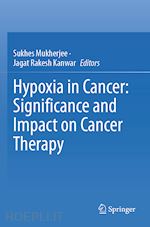
Questo prodotto usufruisce delle SPEDIZIONI GRATIS
selezionando l'opzione Corriere Veloce in fase di ordine.
Pagabile anche con Carta della cultura giovani e del merito, 18App Bonus Cultura e Carta del Docente
Chapter 1. Hypoxia and its Biological Implications for Cancer Therapy.- Chapter 2. Hypoxia's function in cancer.- Chapter 3. Role of Hypoxia and Reactive Oxygen Species in cancer biology.- Chapter 4. Hypoxic tumor microenvironment: driver for cancer progression.- Chapter 5. Hypoxia and Senescence: Role of Oxygen in Modulation of Tumor Suppression.- Chapter 6. Hypoxia Regulated Gene Expression and Metastasis.- Chapter 7. piRNA based cancer therapy in hypoxic tumor.- Chapter 8. MicroRNA Signatures of Tumor Hypoxia.- Chapter 9. Hypoxia and the Metastatic Cascade.- Chapter 10. Hypoxia and Extra Cellular Matrix-major drivers of tumor Metastasis.- Chapter 11. Role of Hypoxia in Cancer Therapy – Introduction.- Chapter 12. Hypoxic regulation of telomerase gene expression in cancer.- Chapter 13. CRISPR/Cas9-editing-based modeling of tumor hypoxia.- Chapter 14. Tumor-on-a-chip: Microfluidic models for Hypoxic tumor microenvironment.- Chapter 15. Imaging the Hypoxic Tumor microenvironment in cancer models.- Chapter 16. Hypoxia-targeting drugs as new cancer chemotherapy agents Hypoxia-targeting drugs as new cancer chemotherapy agents - Molecular Insights.- Chapter 17. Identification of Hypoxia targeting drugs in the tumor microenvironment and prodrug Strategies for Targeting Tumor Hypoxia.- Chapter 18. Hypoxia Induced Apoptosis in Cancer Development.- Chapter 19. Hypoxia in drug resistance and radioresistance.
Dr. Sukhes Mukherjee is working as an Associate Professor in the Biochemistry Department of AIIMS Bhopal, India. Dr. Mukherjee has published more than 60 papers in peer-reviewed journals and presented his work at several national and international conferences. He has also authored or co-authored numerous books and book chapters. Dr. Sukhes got the best paper award from the “Association of Clinical Biochemists of India” in 2008. He got the international travel fellowship to attend the Neurochemistry conference at Busan, South Korea, in August 2009 and another AACC fellowship in 2011. Dr. Mukherjee has been awarded by the International Society for Neurochemistry in 2008 and is a member of the Who’s Who as International Executives. He is elected as a member of the National Academy of Medical Sciences (MNAMS). He has served as executive committee member of various national and international scientific organizations and is also in editorial board and reviewer of several journals.
Dr Jagat R Kanwar is Professor and Head Department of Biochemistry in All India Institute of Medical Sciences (AIIMS), Bhopal, MP, India. He is the highly cited (Globally top 2% highly cited ranked) researcher in 3 disciplines of science (field on oncology, medical chemistry and nanotechnology). Dr. Kanwar earned his PhD from Post Graduate Institute of Medical Education and Research (PGIMER), Chandigarh, India in 1993. In 2002 he joined as Senior Scientist/Senior Research Fellow in The University of Auckland. Professor Kanwar is the group leader and laboratory head of Nanomedicine-Laboratory of Immunology and Molecular Biomedical Research in School of Medicine, Faculty of Health at Deakin University. Prof. Kanwar is currently working on nanotechnology/nanomedicine based protein/peptide, aptamers and his research approach employs monotherapy (gene therapy, immunotherapy) and combinational therapy with commercially available chemotherapeutic agents including LNA-aptamers (RNA/DNA), peptides and other biomolecules such as siRNA, miRNA, aptamers, proteins, siRNA, miRNA and their chimera in cancer and chronic inflammation.











Il sito utilizza cookie ed altri strumenti di tracciamento che raccolgono informazioni dal dispositivo dell’utente. Oltre ai cookie tecnici ed analitici aggregati, strettamente necessari per il funzionamento di questo sito web, previo consenso dell’utente possono essere installati cookie di profilazione e marketing e cookie dei social media. Cliccando su “Accetto tutti i cookie” saranno attivate tutte le categorie di cookie. Per accettare solo deterninate categorie di cookie, cliccare invece su “Impostazioni cookie”. Chiudendo il banner o continuando a navigare saranno installati solo cookie tecnici. Per maggiori dettagli, consultare la Cookie Policy.